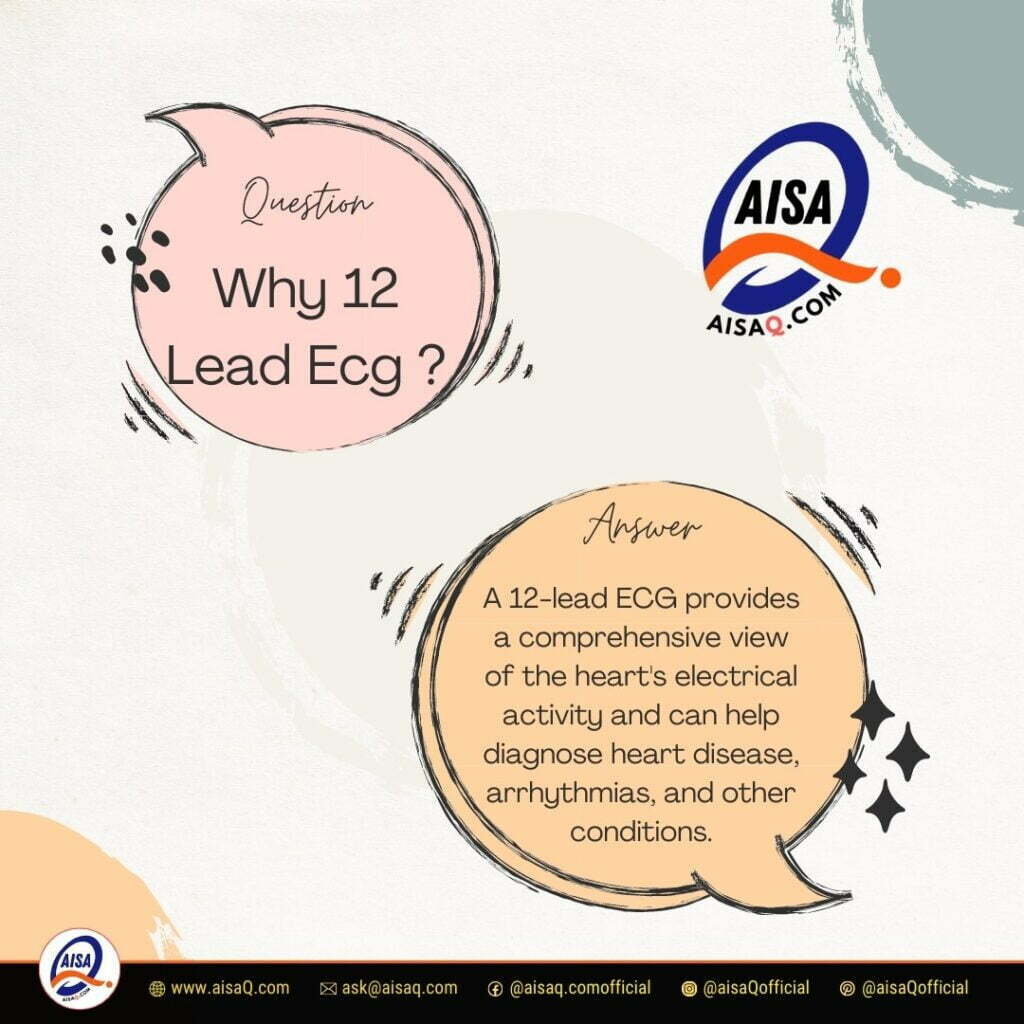Why 12 Lead ECG?
An electrocardiogram, or ECG, is a non-invasive diagnostic test that measures the electrical activity of the heart. A 12 lead ECG is a specific type of ECG that records the heart’s activity from 12 different angles. This allows doctors to see a more complete picture of the heart’s electrical function and to detect any abnormalities or potential issues.
In this article, we’ll explore the importance of a 12 lead ECG in diagnosing heart conditions, how it works, and some common questions and concerns about the procedure.
Table of Contents
What is a 12 Lead ECG?
Before delving into the importance of the 12 lead ECG, it is important to understand what it is. A 12 lead ECG is a diagnostic test that records the electrical activity of the heart from 12 different angles or “leads.” These leads are placed on the patient’s chest, arms, and legs, and provide a detailed view of the heart’s electrical activity. This information can be used to diagnose a variety of cardiac conditions, such as arrhythmias, ischemia, and infarction.
The Importance of Comprehensive Cardiac Assessment
When it comes to assessing cardiac health, a comprehensive approach is necessary. This is because the heart is a complex organ that can be affected by a wide range of factors, including genetics, lifestyle, and environmental factors. A comprehensive cardiac assessment should include a variety of tests, including blood tests, imaging tests, and cardiac function tests. The 12 lead ECG is a critical component of this assessment, as it provides valuable information about the heart’s electrical activity.
Why 12 Lead ECG is Important
A 12 lead ECG is an important diagnostic tool for several reasons:
Reason #1: Diagnosing Heart Attacks

One of the primary reasons why 12 lead ECGs are so important is their ability to diagnose heart attacks quickly and accurately. A heart attack, or myocardial infarction, occurs when blood flow to the heart is blocked, causing damage to the heart muscle. A 12 lead ECG can detect the changes in the heart’s electrical activity that occur during a heart attack, allowing healthcare professionals to diagnose the condition quickly and begin treatment as soon as possible. This can save lives and prevent long-term damage to the heart.
Reason #2: Assessing Heart Rhythm
Another important use for 12 lead ECGs is in assessing the rhythm of the heart. A healthy heart beats in a regular, coordinated rhythm, but abnormalities in heart rhythm can indicate a range of cardiovascular conditions. A 12 lead ECG can detect irregularities in heart rhythm, including arrhythmias such as atrial fibrillation, which can increase the risk of stroke and other complications. By identifying these abnormalities early, healthcare professionals can begin treatment to prevent complications and improve outcomes.
Reason #3: Monitoring Treatment
In addition to diagnosing heart conditions and assessing heart rhythm, 12 lead ECGs are also important for monitoring the effectiveness of treatment for cardiovascular conditions. By performing repeat 12 lead ECGs over time, healthcare professionals can track changes in the heart’s electrical activity and determine whether treatment is working effectively. This is particularly important for conditions such as heart failure, which require ongoing management to prevent complications and improve quality of life.
Reason #4: Pre-operative Screening
Before undergoing surgery, patients may be required to undergo pre-operative screening to ensure that they are healthy enough to undergo the procedure. 12 lead ECGs are an important component of this screening process, as they can detect underlying cardiovascular conditions that may increase the risk of complications during surgery. By identifying these conditions early, healthcare professionals can take steps to manage them and reduce the risk of complications during and after surgery.
Reason #5: Early Detection of Cardiovascular Disease
Finally, 12 lead ECGs are important for the early detection of cardiovascular disease. By detecting changes in the heart’s electrical activity before symptoms appear, healthcare professionals can identify patients who are at risk for cardiovascular disease and begin interventions to prevent or manage the condition. This can include lifestyle modifications such as exercise and diet changes, as well as medications and other treatments to manage high blood pressure, high cholesterol, and other risk factors for cardiovascular disease.
How a 12 Lead ECG Works
During a 12 lead ECG, the patient lies down while electrodes are placed on the chest, arms, and legs. The electrodes are attached to a machine that records the electrical activity of the heart from 12 different angles.
The recorded electrical activity is then printed out in the form of a graph or waveform. Doctors use this information to look for any abnormalities or irregularities in the heart’s electrical function.
Common Concerns and FAQs:
Here are some common questions and concerns about 12 lead ECGs:

Is a 12 lead ECG painful?
No, a 12 lead ECG is a painless procedure that doesn’t require any incisions or injections.
How long does it take?
12 lead ECG typically takes about 5-10 minutes to complete.
Do I need to prepare for the test?
You may be asked to avoid certain medications or to fast for a few hours before the test. Your doctor will give you specific instructions.
What happens if the test shows an abnormality?
Your doctor will interpret the results and may order additional tests or treatments, depending on the specific condition.
How often should a 12 lead ECG be performed?
The frequency of 12 lead ECGs depends on the individual patient’s medical history and condition, as well as the recommendations of their healthcare provider.
Can a 12 lead ECG diagnose all heart conditions?
While 12 lead ECGs are an important diagnostic tool for cardiovascular conditions, they may not be able to diagnose all types of heart conditions. Additional diagnostic tests and clinical evaluations may be necessary for a more comprehensive diagnosis.
Conclusion
A 12 lead ECG is an important diagnostic tool for detecting heart conditions and monitoring the heart’s activity over time. It’s a non-invasive, low-risk, and widely available procedure that can be done in a doctor’s office, clinic, or hospital. If you have concerns about your heart health or are experiencing symptoms, talk to your doctor about whether a 12 lead ECG may be a helpful diagnostic tool for you.
If you want to explore other interesting questions on our site, then don’t forget to bookmark and visit the sitemap.


